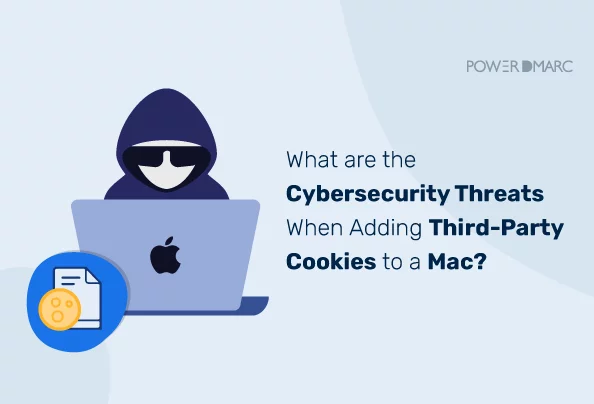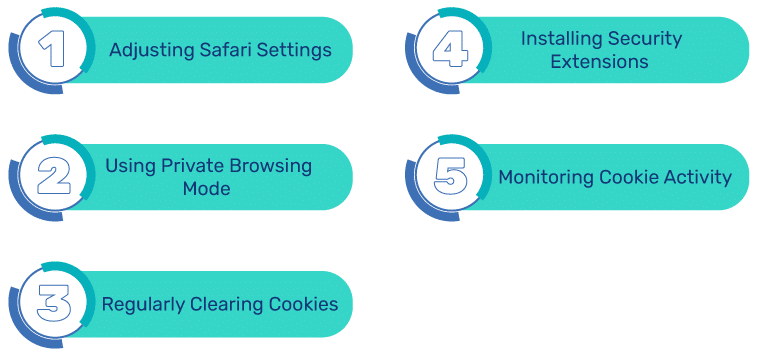
2024-6-29 17:38:26 Author: securityboulevard.com(查看原文) 阅读量:5 收藏
Reading Time: 5 min

Have you ever wondered about the risks of allowing cookies on your Mac? Many users don’t think twice about it. But cybersecurity threats are real. Knowing these threats can protect your data. Let’s explore the dangers of allowing third-party cookies on a Mac. But before that, let’s learn what third-party cookies are. After that, you can read about how to add them safely to a Mac.
What are Third-Party Cookies?

Third-party cookies are small files that websites use to track your activity. They are created by domains other than the one you are visiting. These cookies can follow you across multiple sites, gathering data about your browsing habits. This information is often used for targeted advertising.
Additionally, third-party cookies can store information like login details and preferences. They help advertisers understand your interests better. However, they can also compromise your privacy by sharing your data with various companies. These cookies are stored on your device, sometimes without your knowledge. Knowing how they work can help you manage your online privacy better.
Risks of Allowing Third Party Cookies
Allowing third-party cookies can expose you to significant risks. These cookies track your browsing habits across multiple sites, potentially leading to privacy breaches. They can collect sensitive data without your knowledge, and increase the risk of malware infections. Additionally, they can open security gaps, making your personal information vulnerable to unauthorized access. Read about these threats in detail here:
Privacy Invasion
Third-party cookies can invade your privacy. They track your online behavior, including the sites you visit and the time you spend on them. They even track what you click on. This data is valuable to advertisers, but it can feel like an invasion of your personal space.
Data Collection and Sharing
Cookies collect a lot of data. This data can be shared with third parties. Sometimes, it is sold to other companies. Your browsing habits are no longer private. This data can be used in ways you might disagree with. It can lead to targeted ads that follow you everywhere.
Identity Theft Risks
Cookies can sometimes collect sensitive information. This includes login details or personal data. If hackers access this data, they can steal your identity. Identity theft is a serious threat. It can lead to financial loss and damage to your reputation.
Increased Malware Risk
Third-party cookies can be a gateway for malware. Hackers use cookies to track your activities. They can then target you with malicious software. This malware can infect your system. It can steal your data or harm your computer. Always be cautious about the cookies you allow.
Slower Browsing Speeds
Cookies can slow down your browser. They store data on your computer. Over time, this data can accumulate. It takes up space and slows down your system. This can make your browsing experience less enjoyable. Regularly clearing cookies can help, but it’s not a complete solution.
Security Vulnerabilities
Cookies can create security vulnerabilities. They can be exploited by hackers. This can lead to unauthorized access to your data. Websites you trust may not have the best security. This makes it easier for hackers to use cookies against you.
Targeted Advertising Concerns
Targeted ads can be annoying. They follow you everywhere. They are based on the data collected by cookies. While some find them useful, others see them as intrusive. These ads can also reveal your browsing habits to others who use your computer.
Browser Hijacking
Browser hijacking is a threat. Hackers use cookies to take control of your browser. They can change your settings. They can redirect you to malicious sites. This can be dangerous. It’s important to protect your browser from such threats.
Tracking Without Consent
Cookies can track you without your consent. Many websites do not ask for permission. They automatically allow cookies. This tracking happens without you knowing. It’s a violation of your privacy. Always check your browser settings to control cookie permissions.
Protecting Your Privacy
There are ways to protect your privacy. Use browser settings to manage cookies. Regularly clear your cookies. Use privacy-focused browsers. These steps can reduce the risk. Being aware of the threats helps you take better precautions.
How to Safely Allow Third-Party Cookies on Mac?
Understanding how to add third party cookies on Mac is essential for maintaining security. Start by:

Adjusting Safari Settings
To safely allow third-party cookies on your Mac, start with Safari settings. Open Safari and go to Preferences. Click on the Privacy tab. Here, you can manage your cookie settings. Select “Allow from websites I visit” to control third-party cookies. This setting balances functionality with safety.
Using Private Browsing Mode
Private browsing mode can be a safer way to handle third-party cookies. Open a new private window in Safari. This mode doesn’t save cookies after you close the browser. It helps keep your browsing activity more secure. Use this mode when accessing sites that require third-party cookies.
Regularly Clearing Cookies
Clear your cookies regularly to maintain privacy. In Safari, go to Preferences and select Privacy. Click on “Manage Website Data” and remove unwanted cookies. Regular clearing reduces the risk of data accumulation and potential security threats. Make this a regular habit for better security.
Installing Security Extensions
Consider installing security extensions for added protection. Extensions like ad blockers and privacy guards can control cookie usage. They help block harmful cookies and manage safe ones. Look for trusted extensions that work well with Safari. These tools enhance your browsing security.
Monitoring Cookie Activity
Keep an eye on your cookie activity. Safari allows you to view and manage cookies. Check which sites are setting cookies on your Mac. Remove any that seem suspicious. Regular monitoring helps ensure that only safe cookies are stored. Stay vigilant to protect your data and privacy.
Summing up
Navigating the digital world can be tricky, especially with third-party cookies on your Mac. These tiny files help personalize your browsing but come with big cybersecurity risks. It’s super important to take steps to protect your privacy and data. Start by tweaking your browser settings to limit cookies, and make it a habit to clear them regularly.
Use privacy-focused tools and extensions to boost your security. Staying informed and being cautious means you can enjoy the perks of third-party cookies without the downsides. Keep your online safety a priority to enjoy a secure and private browsing experience.

*** This is a Security Bloggers Network syndicated blog from PowerDMARC authored by Ahona Rudra. Read the original post at: https://powerdmarc.com/third-party-cookies-mac-security-risks/
如有侵权请联系:admin#unsafe.sh